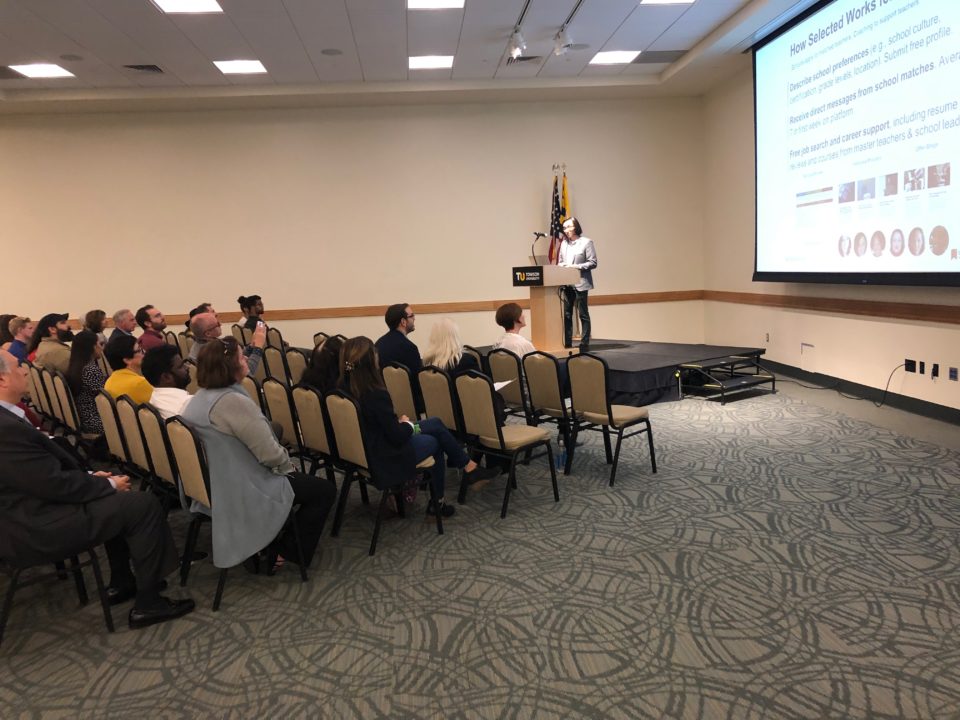As technology continues to evolve, humans go on to find new applications for it to enhance everyday life, from how we exercise to how we communicate with each other.
And one of the most potentially impactful avenues for technology is edtech, aka the technology that seeks to address issues in the education space such as assessment, funding, professional development and engagement.
TU Incubator, a Towson University-based network that provides resources for startups in the Greater Baltimore region, hosted its fourth annual EdTech Innovation Showcase on Thursday night at Towson as part of Baltimore Innovation Week to give entrepreneurs in the edtech space an opportunity to present their companies.
“We try to invite a lot of school districts, administrators, teachers — post secondary, K-12 — so that hopefully they can make good connections that might lead ultimately to some pilot projects and customers,” said David Cross, assistant director of venture creation at Towson.
Educators and technologists alike networked before the program’s annual pitch competition, where 10 companies pitched their concepts in two minutes. Here’s a look at the 10 startups that took the stage:
Conversifi
Learning a language through online courses is doable, but there is no better language practice than actually speaking the language in a real conversation, believe founder and CEO Steven Krubiner.
Conversifi connects foreign language learners with native speakers through video chat in order to facilitate cross-cultural interaction and language practice.
“The global language market is saturated with language apps, language institutions, textbook publishers, but what makes us unique is we designed our solution to integrate with and enhance the value of everyone else in this space,” Krubiner said.
Krubiner has a background in international relations. He spent 15 years working on the Israeli-Palestinian conflict, but language always remained integral in his job: In 2007, he was sent to Madrid for six months to attend an Arab-Israeli peace conference because he was the only person on staff who spoke Arabic, Hebrew and Spanish.
“One of the very present themes for me was the impact that language can have on connecting a cross-cultural divide and language divides,” he said. “It makes a big difference in the negotiating room and outside the negotiating room.”
InferCabulary
Cofounder and CEO Beth Lawrence seeks to address poor teaching methodology related to literacy problems among K-12 students in the United States.
“One of the big problems is that we continue pedagogically to teach language concepts to students who struggle with language concepts,” Lawrence said.
Infercabulary offers a web-based vocabulary app that uses images to help students learn words and use critical thinking. The app uses kid-friendly definitions instead of traditional definitions, which often contain complex words.
We Are Marcus
Founder and CEO of Christopher King experienced poor guidance and mentorship firsthand when he was a child. Now, his company seeks to prevent a lack of proper guidance among underserved communities.
“I stand before you today being told clearly in high school by my guidance counselor that I would never attend a four-year university,” King said. “That profoundly impacted my life and led me to seek out mentorship.”
We Are Marcus, founded in 2016, offers an online character development program that allows educators to better perceive engagement among students.
Selected
Cofounder and CEO Waine Tam is no cupid, but his company seeks to match teachers with schools and jobs they love.
Selected is a matching platform for K-12 teachers, including public and private institutions. With high turnover among teachers, Tam looks to place teachers in ideal locations.
“We like to say schools apply to you, not the other way around,” Tam said. “[Selected is] kind of like a dating site where the teachers are the attractive people in the room.”
CoAuthor
With technology consuming people’s everyday lives, it’s easy to become easily distracted by one’s phone or tablet. Those lost hours scrolling on social media or playing games could result in neglect of other tasks or even worse, loved ones.
“Children are competing with smartphones for the attention of their caregivers,” said Marwa Abdelfattah, founder and CEO. “Without high-quality daily engagement with caregivers, children can develop learning difficulties, unstable social relations and even depression.”
CoAuthor is an app that helps people interact and engage with children through prompted dialogue templates.
ClearAlignment
As schools progress through the digital age, they must adjust to developing technology in order to provide students with viable resources. Yet many schools have kept certain technology and traditions for a long while, making it difficult to transition to a more digital approach.
That’s where ClearAlignment comes in: The platform aids universities in integrating online learning courses and shifting to digital instruction.
“If quality education is part of your vision, we’ll find out how to get your course programs online,” said CEO Sara Tarr.
OgStar Reading
Cofounders Dr. Fran Bowman and Stephanie Nislow also seek to address the literacy gap. OgStar Reading provides an app that offers a home or school-based structured literacy lessons for developing readers, English language learners, dyslexic students and other struggling students ages 4 to 13.
“By the end of [the courses], they are exposed to all the sounds of the English language, prefixes, suffixes and roots,” Bowman said. “They’re able to read some pretty complicated things even though they start out with just one little letter and one little sentence.”
The app is available for individual families and is used in school districts as well.
Ortus Academy
In adulthood, people learn to make smart decisions with their money such as saving and investing. But many people don’t know how to properly take care of their money until they’re forced to learn.
Ortus Academy looks to stop that norm by offering children financial education in order to shape financially wise adults.
“Learning about money could change the way young adults see the future and see possibilities,” said cofounder and CEO Aaron Velky. “Money matters, but financial intelligence matters more.”
TransitioningU
It’s widely understood that college is not for everyone, but many who attend college expect an enjoyable and educational experience. That’s not always the case, though. Schools spend an exorbitant amount of money to recruit students, but some schools struggle to retain those same students. This can be due to a lack of a personalized experience, among other factors.
TransitioningU is a student engagement platform that aims to help students have the most fulfilling college experience possible and improve graduation and retention rates across the United States.
“We want to help 2,000 colleges that have graduation rates less than 50% move that needle,” said Joshua Smith, chief academic officer.
Happy Teacher Revolution
Founder Danna Thomas struggled with anxiety, depression and panic attacks throughout high school and college, but she didn’t suffer in silence. Several of Thomas’s teachers noticed her problems and encouraged her to seek treatment.
Thomas got help and became inspired to become an educator herself, so she served as a Baltimore County public school teacher for seven years. Throughout her teaching career, she noticed that many other teachers suffered from the same issues that Thomas dealt with in her time as a student.
Now, Thomas wants to give back to the educator community by addressing the stress-induced mental health issues that arise from teaching. Happy Teacher Revolution seeks to become an international movement that focuses on supporting the mental health and wellness of teachers.
“Without my teachers, I wouldn’t be standing before you today,” Thomas said. “My solution is a revolution.”
Join the conversation!
Find news, events, jobs and people who share your interests on Technical.ly's open community Slack

Baltimore daily roundup: An HBCU innovation champion's journey; Sen. Sanders visits Morgan State; Humane Ai review debate

Baltimore daily roundup: Medtech made in Baltimore; Sen. Sanders visits Morgan State; Humane Ai review debate

Baltimore daily roundup: The city's new esports lab; a conference in Wilmington; GBC reports $4B of economic activity


